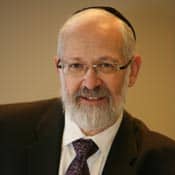"Keep it simple, rabbi." The request before a holiday is as reasonable as it is predictable. The interviewer wants the Big Picture of the upcoming celebration, to share with the wider audience. Surely, the interviewer urges, you can find the universal message of your holiday so that everyone can enjoy it?
Play along, and the result is insipid. It's like having a serious Christian reduce Christmas and Easter to gift-giving and Easter-egg rolling. Passover, which will be upon us hours after I submit this piece, inevitably becomes the holiday celebrating human freedom. Now freedom is a cherished commodity whose value cannot be overstated. But observant Jews wince when a season so full of other meaning is eviscerated, shriveled, and hung out to dry. Passover primarily celebrates the creation of a Jewish nation by G-d reaching out and revealing to the ancient Hebrews—and the rest of the world!—Who He is, how His providence extends to the lives of individual men and women, and how breathtakingly limitless are His abilities.
Sharing the Big Picture, then, either means counterfeiting it, or stating it accurately and leaving the well-wishing outsider standing on the sidelines.
Does this mean that I should forego the interviews? Not at all. My solution is to abandon the Big Picture, and embrace the little one. While the holiday as a whole might still reside in a Restricted Access area, particular observances can have meaning for everyone.
Consider the search for leaven, conducted on the evening of the last Jewish calendar day before the beginning of Passover. The preparations for Passover take weeks of intense labor, searching in nooks and crannies for leaven, as if they housed deadly bits of radioactive material. The house is turned over, in a kind of Divinely commanded spring cleaning, purging the premises of leaven that is usually not found anyway. Yet, after weeks of vacuuming, scrubbing, scalding, and picking at the oven more demandingly than the best auto detailer, the night before Passover we go through the house once more, looking for what surely will not be found. In most households, just to make sure that the pursuit yields something tangible, someone will place ten pieces of bread where they can be discovered by the search party.
This can all be explained. Trust me. Harder to explain is that Jewish law requires that the search be conducted at night, illuminated by a lamp or candle (or the modern analogue, in the form of a flashlight). Why not search during the day, aided by plenty of background illumination? The Talmud says that this won't do. The contribution of the candle cannot be appreciated by day, when there is plenty of available light.
This makes little sense. What's important—the candle, or the search? Won't the much greater amount of daylight make for a more efficient search?
Perhaps not. It might depend on what you are looking for.
Leaven—grain products that have begun to rise as a result of partial fermentation of their sugars—symbolizes Man's evil urges and tendencies. Matzah, which substitutes for bread on Passover, has been rushed to the oven before fermentation produces the carbon dioxide that causes dough to rise and become soft and fluffy. Leave dough unprotected, and after enough time, yeast spores invisible to the naked eye will turn it into a free lunch, eventually souring it, and causing it to rise.
In hundreds of years of Jewish thought, the dough is seen as Man. It does not take much to "sour" him, to get him to go bad. Evil tendencies within us are insidious. They don't announce themselves in advance, and they never take a break and go away. If you do nothing, evil will inevitably cause you some grief. The only way to deal with it is proactively. You need to know that it is there, take it seriously, and resist it in advance of its inaudible whispering in our unconscious thought.
Avoiding chametz (leaven) on Passover is about hunting down, identifying, and purging the evil inclinations in our character. The houses we search are, by extension, those of flesh and blood that house our souls.
What does this have to do with leaving the bondage of ancient Egypt? Egypt in Hebrew is Mitzrayim, etymologically related to mitzarim, or confining boundaries. Most of us are slaves to various Pharaohs inside of us. We are not free so long as we are weighed down by faults and behavior patterns that limit our abilities to be the best we can. Passover is indeed the holiday of liberation—not from an ancient oppressor alone, but an immediate one, from the flaws that make us smaller and less effective.
Here's where the beauty of the search for leaven comes in.
Search by day, and your eye will take in much more at one time. Search at night, and you can only illuminate a small area at a time. You have no choice but to hold the candle close, and peer closely and intensely at one spot at a time.
The lesson is clear. When people look at the totality of themselves and are asked whether they see a good person or a bad one, most people will see themselves as good. Most of them are probably right. They are asking the wrong question, though. To soar, to rid oneself of the dross that gets in the way of becoming what G-d designed us to be, it is not enough to be a good person. One has to efficiently use every talent and blessing G-d has given him. To do this, one has to abandon all kinds of flaws and failures, large and small. The only serious way to do this is by examining one's personality, one small portion at a time.
Looking at the little picture can be more useful than using the big one.
4/18/2011 4:00:00 AM





